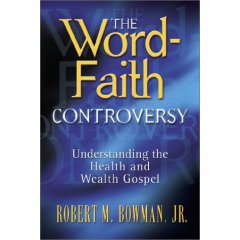|
The Word Faith Controversy by Robert M. Bowman, Jr. Reviewed by Tim Chaffey |
Robert Bowman's book on the controversial Word-Faith Movement is perhaps the most balanced book I have ever read on any controversial issue. Rather than uncritically accepting all who proclaim the name of Christ, Bowman examines the "roots, shoots, and fruits" of this movement. Also, instead of condemning the movement based on some of their most radical proponents (Kenneth Copeland, Charles Capps, Benny Hinn, and Earl Paulk), Bowman looks at the movement as a whole. The result is an outstanding book that is a must read for anyone interested in learning more about Word-Fath.
I have some very good friends who are involved in this belief system. One of these friends is one of the most genuine individuals I have ever been around. I have always struggled to understand how they can love the Lord and be such devout believers while at the same time holding to such aberrant theology.[1] This book helped explain this difficulty.
Bowman traces the roots of the movement to Essek William Kenyon. The first few chapters are dedicated to the influences in Kenyon’s life and the people that he influenced. Bowman points out some of the unfair attacks made by the Word-Faith’s critics who link Kenyon’s teachings to the metaphysical cults. While there is some similarity, the chart on page 47 is helpful in clearing up the matter. Bowman concludes that the evangelical faith-cure and early Pentecostal movements had the greatest influence on Kenyon’s theology.
The final two-thirds of the book examines the movement in a point-by-point fashion. Each questionable teaching is analyzed from a biblical perspective. This section includes the following chapters:
- Real Men Don’t Use Reason
- Does God Have Faith?
- The God With a Bod
- Big God, Little Gods
- Dominion and the Devil
- Confessing Jesus – A New Twist
- The Rise and Fall of the Born-Again Jesus
- Just Like Jesus?
- The Faith Debate
- On Being Healthy, Wealthy, and Wise
Perhaps the best part of this book is that Bowman avoided the common stereotypes of the movement, such as “Name it, Claim it” and “Gab it, Grab it.” He also was very careful to point out on numerous occasions that many of the rank-and-file in the movement do not share some of Hagin’s, Copeland’s, Crouch’s, Hinn’s, and/or Capps’ outlandish views. He does take the time to critique these views but cautions the reader against believing that they represent the whole of the movement.
It is so easy for a Christian who has been convicted of the truth or falsity of a particular teaching to see any contrary view as being heretical. We have to understand that this is not necessarily the case. Many Christians (including myself) are not always as careful as we need to be. Robert Bowman did an incredible job of taking an objective[2] look at the Word Faith Movement and in doing so has done the Church a huge favor. In conclusion, the Word-Faith Movement should not be so quickly condemned as heretical. Neither should it be uncritically accepted as orthodox. False teachings, rank heresy, and false prophecy abound from some of the bigger names. Nevertheless, believers should be aware of the general beliefs of this movement so that they can engage the Word-Faith adherent in a constructive dialogue. This book is an outstanding resource to help the believer accomplish this.
Finally, I was looking over the reviews of this book on Amazon.com and noticed that it received one star from a particular reader. Based on this “reader’s” comments, it is obvious that Dr. James Macey has not even read this book because he would not include Bowman’s name along with the other critical authors of this movement. Nevertheless, Macey’s “review” is a classic example of the need for a sober critique such as Bowman has provided.
[1] Following Bowman’s example, we use the term aberrant to signify something less than orthodox but also short of heresy.
[2] We realize that no person can be completely objective because we all have biases. However, by comparison to other critics of this movement, Bowman is extremely fair.
|
Rating: (10 out of 10) About the Author (coming)
|
